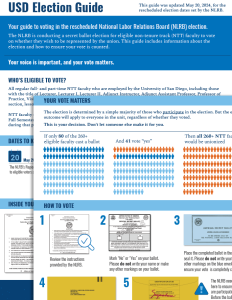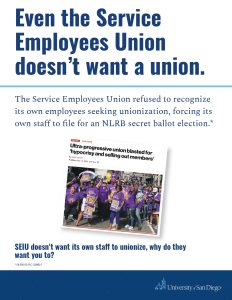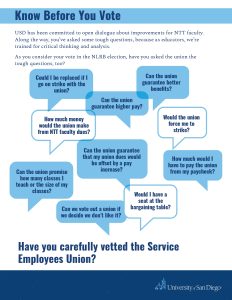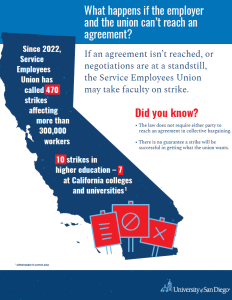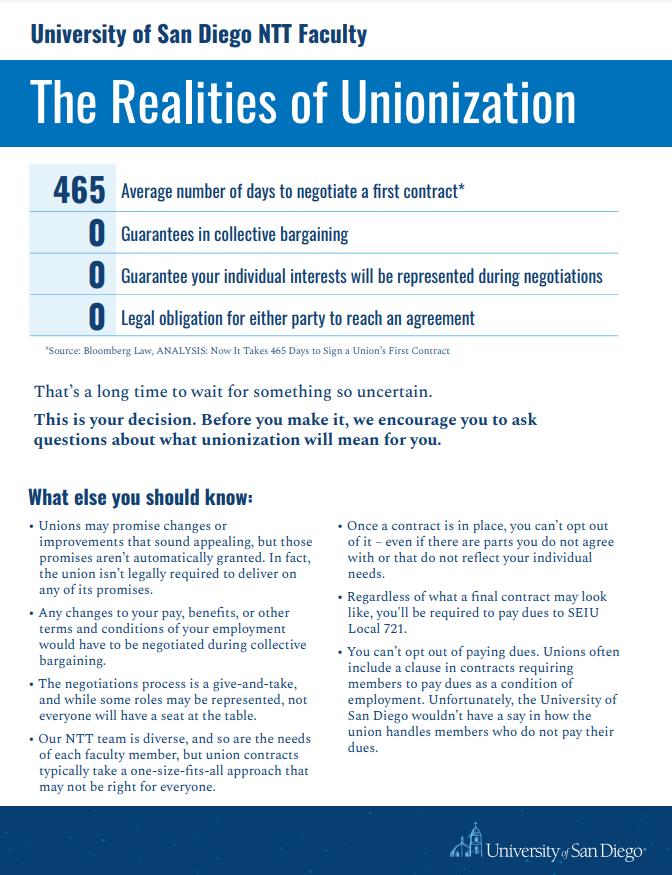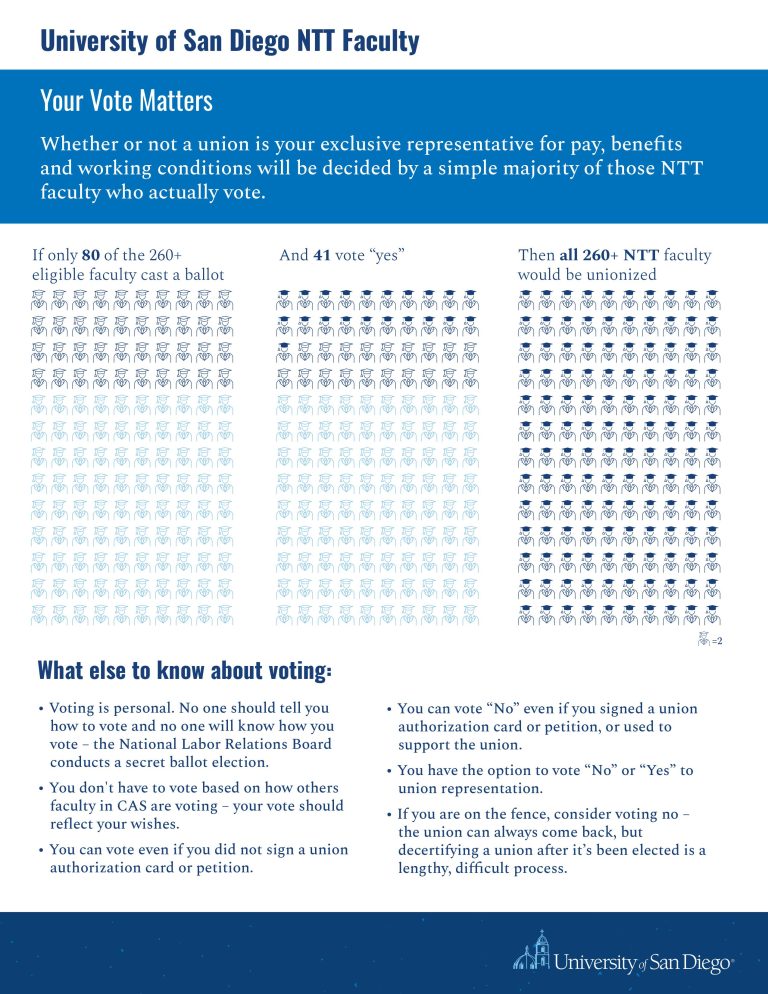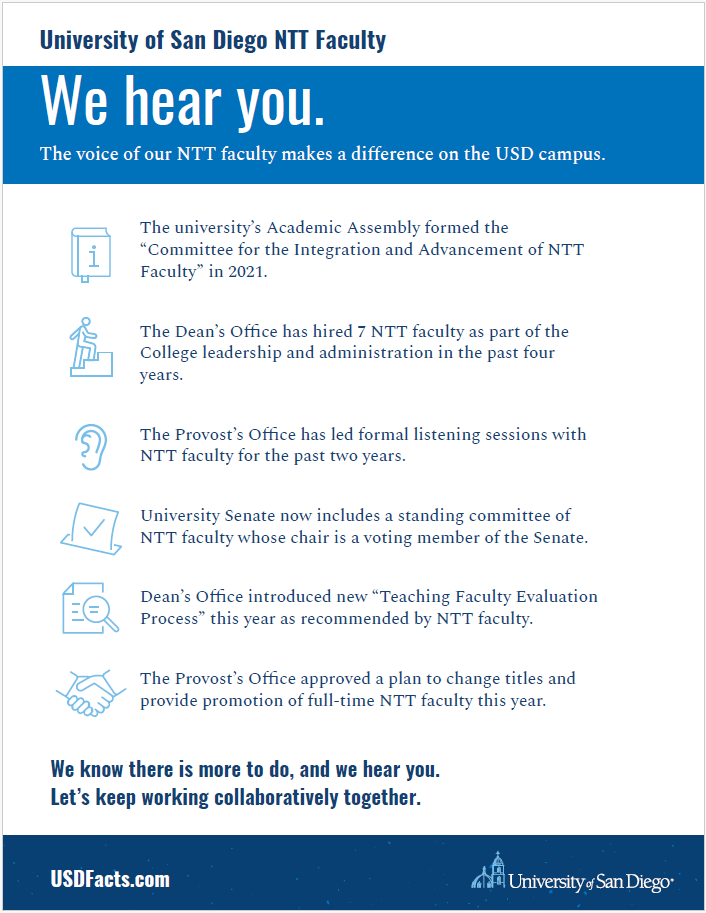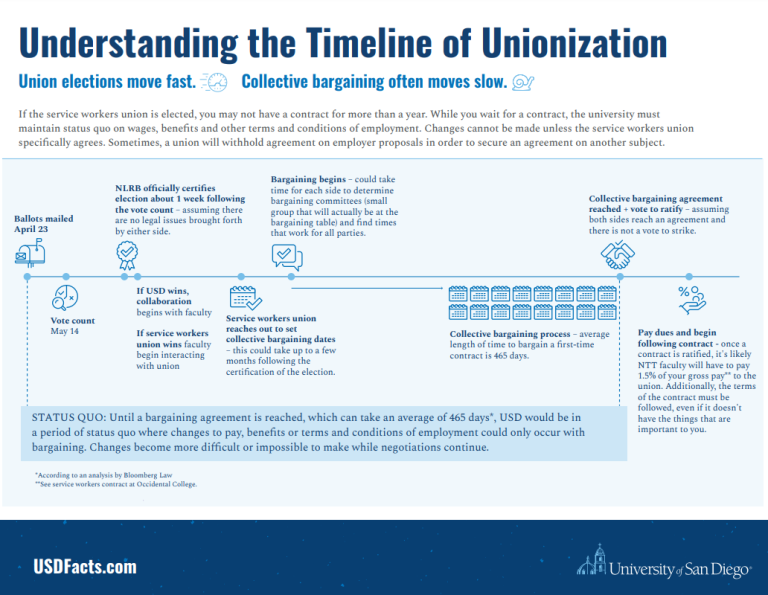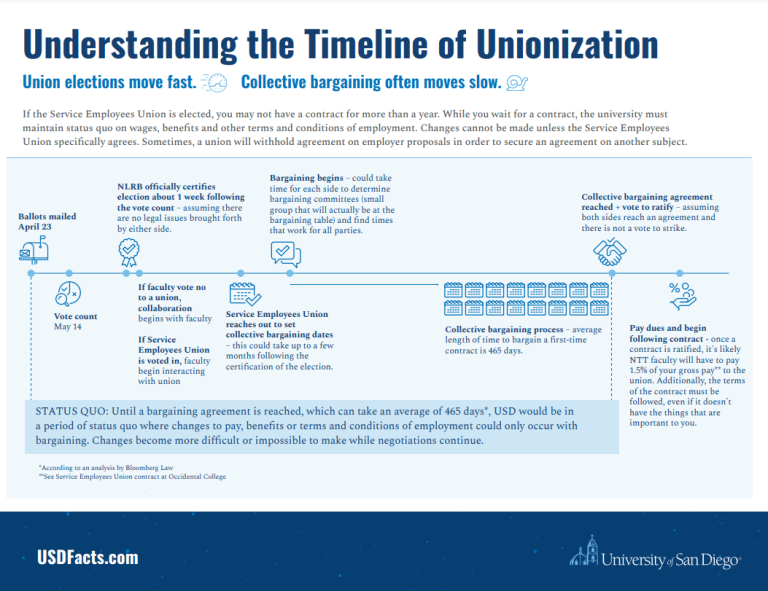WELCOME TO USD FACTS
Get the Facts: Information about NTT faculty unionization at USD
We developed this site for Non-Tenure Track (“NTT”) faculty to share the University of San Diego’s commitment to maintaining a collaborative working relationship, and to provide important details about what the formation of a collective bargaining unit and union representation would mean for you, our campus, and our students. The FAQs are meant to provide information for you to make fully informed decisions. This site will be updated regularly, so check back often for the latest facts about this important choice.
Rescheduled Election - Dates to Know
- May 20 - Ballots mailed to eligible voters
- May 28 - If you haven't received a ballot by this date, notify the NLRB.
- 2:30 PM - June 18 - Ballots must be received at NLRB office
- June 18 - Ballots counted
Latest Developments
NEW: Date Set for New NLRB Election
The National Labor Relations Board notified USD on May 7 that due to a delivery address error with the U.S. Postal Service, the NLRB office did not receive many of ballots cast by NTT faculty in the current election. For that reason, ballots previously submitted by USD’s voting faculty are void and a new election period has been set. The NLRB has directed a new election for NTT faculty. Ballots will be mailed to NTT voters beginning May 20. Votes will be counted June 18. Read more in this letter from Chief Legal Officer Thomas Skinner.-
NEW: Your Personal Information Shared with Service Employees International Union Local 721
-
NEW: Collective Bargaining FAQs
-
The Realities of Unionization. What is the average number of days to negotiate a first contract?
-
Your Vote Matters. Whether or not a union is your exclusive representative for pay, benefits and working conditions will be decided by a simple majority of those NTT faculty who actually vote.
-
We hear you. The voice of our NTT faculty makes a difference on the USD campus.
-
NEW: Understanding the Timeline of Unionization. Union elections move fast. Collective bargaining often moves slow.
NEW: Understanding the Timeline of Unionization. Union elections move fast. Collective bargaining often moves slow.
The Realities of Unionization. What is the average number of days to negotiate a first contract?
Your Vote Matters. Whether or not a union is your exclusive representative for pay, benefits and working conditions will be decided by a simple majority of those NTT faculty who actually vote.
We hear you. The voice of our NTT faculty makes a difference on the USD campus.
University of San Diego
NTT Faculty
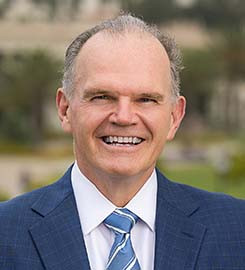
Providing the best possible work environment for our faculty, regardless of their rank, is vitally important to our community. The members of our USD community are proud of our culture of care and our mission to uphold human dignity. Rooted in our Catholic values, our culture of care is regularly cited as one of the distinguishing and most appreciated characteristics of our campus.
This culture was not created by accident – it was created by members of our community working together intentionally, in direct relationships with each other.
Our NTT faculty are valued colleagues, and their contributions are significant. Over the past decade, the university has made great strides in enhancing and supporting the work of NTT faculty, and this continues to be a priority.
We also understand that there is more to be done. We are committed to working collaboratively with NTT faculty to create the best possible learning environment for our students and work environment for our faculty.
We should ensure that the information considered by all interested parties is accurate, and that everyone is fairly informed so they can make the best decision for themselves and their families as the effort to organize in CAS proceeds. USD encourages every member of our community to ask questions and learn more about unionization – both its pros and cons.
USD respects the right of every individual to form their own opinion and encourages each member of the community to consider whether, and how, inserting a third party might impact our culture of working directly and collaboratively with one another. USD will continue to share information.
We all agree that providing the best possible environment for our faculty, regardless of rank, is vitally important to our community. USD is proud of its culture of care and its mission to uphold human dignity. Rooted in our Catholic values, our culture of care is regularly cited as one of the distinguishing and most appreciated characteristics of our campus.
This culture was not created by accident – it was created by members of our community working together intentionally, in direct relationships with each other.
Our NTT faculty are valued colleagues and their contributions are significant. Over the past decade, we have made significant efforts to enhance and support the work of NTT faculty, and we continue to prioritize those efforts across the university.
We also understand that there is more to be done. We are committed to working with you to create the best possible learning environment for our students and work environment for our faculty.
We should ensure that the information considered by all interested parties is accurate, and that everyone is fairly informed so they can make the best decision for themselves as the effort to organize in CAS proceeds. We encourage every member of our community to ask questions and learn more about unionization – both its pros and cons. USD will continue to share information as well.
USD respects the right of every individual to form their own opinion. We encourage each member of our community to consider whether, and how, inserting a third party unaffiliated with the university might impact our culture of working directly with one another.
Maintaining the best possible work environment for our faculty, both tenure track and non-tenure track, is essential to the academic vitality of our campus. This commitment includes our mission to uphold human dignity and support one another in our pursuit of knowledge. Rooted in our Catholic values, our culture of care is regularly cited as one of the distinguishing and most appreciated characteristics of our campus.
This culture was not created by accident – it was created by members of our community working together intentionally, in direct relationships with each other. The possibility of losing this collaborative environment to a third party would undermine the very core of what makes us unique.
But the concerns of our NTT faculty are real, and we hear you.

The Office of the Provost, faculty committees, and many others at USD have been in substantive conversations with NTT faculty members to identify opportunities for enhanced job stability, compensation, and advancement. The Provost conducted listening sessions with NTT faculty members across USD consistently over the past two years to learn about their concerns and determine how the university could address them. In fact, we had already begun to implement improvements based on these discussions. That’s why we were surprised to learn that the SEIU was working with members of our NTT faculty to form union within the CAS during what we thought was a productive, proactive dialogue.
As fellow academics, your passion is the pursuit of research, education, and scholarship toward truth and discovery. This process should be no different. I encourage every member of our community, particularly our NTT faculty, to ask questions and learn more about unionization – both its pros and cons – before making a decision. We will continue to share information to support you.
Peace,
Jim
University of San Diego
Statement on Unionization
The University of San Diego is committed to a culture of care and the dignity of all people, in alignment with Catholic Social Teachings on workplace justice. The university’s non-tenure track faculty (NTT) are valued colleagues who are important contributors to this culture.
This campus environment was not created by accident – it was created by members of our community working together, in direct relationships with each other. USD respects the right of every individual to form their own opinion about unionization; we also believe the university and all faculty can best address compensation, benefits, working conditions and professional opportunities through direct conversations with our faculty—not through relinquishing that authority to a third party unaffiliated with the University.
FAQs
Click the questions below to see the answers.
Rescheduled NLRB Election
The NLRB may hold a hearing to determine:
-Which faculty will be eligible to vote
-When and how the election will take place
-Other details related to the election
Ballots received by the NLRB office for the election on May 14 are no longer valid, and will not be counted. These ballots will be segregated by NLRB staff.
No. No identifying information is included in the ballot or envelope.
To ensure as many faculty as possible can participate in the new election, it will also be conducted by mail ballot. However, the SEIU insisted on holding the election at a time when many if not most NTTs are not on campus.
The NLRB has confirmed their correct delivery address with the U.S. Postal Service to ensure that the return envelopes for the new election are delivered to the correct address.
Yes. The NLRB has called the current election void. That means all ballots, received or lost, will not be counted and will be voided.
Union Representation
The NLRB may hold a hearing to determine:
-Which faculty will be eligible to vote
-When and how the election will take place
-Other details related to the election
Yes. California is not a Right to Work state, which means if the union is voted in, all faculty in the bargaining unit can be required to pay dues to the union as a condition of employment. Many unions, including SEIU, put a clause in the contract that says you can be terminated for not paying dues. Once the contract is final, the University would not have any say over what the union does with respect to non-dues paying members. In fact, here is a clause from the collective bargaining agreement between the Occidental College and the Service Employees Union:
“Each employee shall, within 31 days after the date of execution of this Agreement or such employee’s date of hire whichever is later, become a union member or have agency feeds deducted from their compensation as described below. The College shall discharge an employee who has failed to comply with this provision.” (Source: Article 4, Occidental College collective bargaining agreement with SEIU Local 721)
Even if you choose not to become a dues-paying union member, you may still be required to pay an “agency fee” to the union, to help cover the cost of representation.
If the union is voted in, they represent everyone in the bargaining unit, regardless of whether you voted for or against it. You cannot opt out of that representation. And once there is a final labor contract, everyone in the unit must follow it.
Voting
The NLRB may hold a hearing to determine:
-Which faculty will be eligible to vote
-When and how the election will take place
-Other details related to the election
It’s important to remember that in the NLRB election, not voting is not the same as voting no. If the union wins, it represents everyone in the unit, including those who voted ‘No,’ or did not vote. The union then becomes the sole agent to bargain compensation, benefits and working conditions for all in the unit. Whether or not a union is your exclusive representative for pay, benefits and working conditions will be decided by a simple majority of those NTT faculty who actually vote—just like in a presidential election—not of those eligible to vote. If you do not vote, you are ceding your right to those who do vote.
Yes. You can cast your ballot whether or not you signed a union authorization card or petition. You can vote “No” in the election even if you signed a union authorization card or petition, or used to support the union and changed your mind. Voting is personal. No one should tell you how to vote and no one will know how you vote—the National Labor Relations Board conducts a secret ballot election, again, just like in a presidential election.
Petition and Election
The NLRB may hold a hearing to determine:
-Which faculty will be eligible to vote
-When and how the election will take place
-Other details related to the election
The NLRB may hold a hearing to determine:
-Which faculty will be eligible to vote
-When and how the election will take place
-Other details related to the election
The NLRB oversees the election process, which allows any NTT faculty eligible to be part of the proposed unionized group to vote for or against unionization. The NLRB collects and tallies the confidential ballots — neither the University of San Diego nor the union would know how any individual voted.
A secret ballot election usually happens within a few weeks after an NLRB hearing, but we will share details as soon as we have them.
No. Many unions will promise they can provide higher pay or guarantee better benefits, but, if the union wins the election, the union and University of San Diego would have to bargain over these issues. There are no guarantees on the outcome of negotiations. Electing a union only guarantees the union would represent faculty in all matters related to pay, benefits and working conditions, and unionized faculty would likely have to pay the union dues or representation fees. We believe issues and challenges are best addressed when leaders and faculty work together to fix problems through our shared governance model.
About Union Cards
You recently may have received information from union organizers within the College of Arts and Sciences urging you to sign a union authorization card (and an online link to the form).
A union card is not a request for more information or to be added or removed from the union’s mailing list.
A union authorization card is a legally binding document, and by signing it you state that you authorize the union to represent you for purposes of collective bargaining. Once submitted, it is very difficult to later change your mind and withdraw it.
Before making a decision on whether to submit your card, we urge you to take the time to educate yourself about all of the potential ramifications of forming a collective bargaining unit and joining Service Employees International Union Local 721 (“SEIU”).
This website is one of the ways that USD will provide information to help inform your decision. We also encourage you to conduct your own independent research.
You recently may have received information from union organizers within the College of Arts and Sciences urging you to sign a union authorization card (and an online link to the form).
A union card is not a request for more information or to be added or removed from the union’s mailing list.
A union authorization card is a legally binding document, and by signing it you state that you authorize the union to represent you for purposes of collective bargaining. Once submitted, it is very difficult to later change your mind and withdraw it.
Before making a decision on whether to submit your card, we urge you to take the time to educate yourself about all of the potential ramifications of forming a collective bargaining unit and joining Service Employees International Union Local 721 (“SEIU”).
This website is one of the ways that USD will provide information to help inform your decision. We also encourage you to conduct your own independent research.
About a Union at USD
We have recently become aware of outside efforts to encourage non-tenure track (NTT) faculty members within the College of Arts and Sciences (CAS) to unionize. Board of Trustees Chair Tom Mulvaney and President Harris received a letter from Dr. Diane Keeling dated March 7 with the subject, “TT Faculty Letter Supporting a Free and Fair Process of NTT Faculty Unionization.”
We support and respect the right of every individual to form their own opinion on this topic. We also want to ensure that our campus community is provided with the facts about how a third party might impact our culture of care and working directly with one another.
The University of San Diego highly values its non-tenure track faculty (NTT). We hope to continue working directly with our faculty members on these matters going forward because, in our view, the university can best continue to address issues like governance, compensation, benefits, working conditions, and professional opportunities, through direct conversations with you.
The question is not whether each of us supports the concept of represented labor in general. Rather, the question is whether it would be beneficial for USD NTT faculty to be represented by SEIU. Would it help us to achieve belonging, inclusion, and access? Would it impact USD’s culture, and how we work with each other, in a positive way?
USD wants the best for all of our colleagues. Whether or not to relinquish authority to a union to bargain for pay, shared governance, terms of appointment, benefits and working conditions, is a personal choice, and one that should not be made lightly.
USD is committed to a culture of care and the dignity of all people in alignment with Catholic Social Teachings on workplace justice.
Over the past decade, we have worked to enhance and support the work of NTT faculty in the College of Arts and Sciences and beyond. We also understand that there is more work to be done. We are committed to working directly with you to create the best possible learning environment for our students.
At USD, we want to continue the direct relationship with our faculty. Since Fall 2019, nine representatives of NTT faculty have been included as members of the College of Arts and Science’s Academic Assembly, and the University Senate created a standing committee to represent the interests of NTT faculty in 2023 with the committee chair serving as a voting member of the Senate.
The formation of a collective bargaining unit of NTTs within CAS would interpose the SEIU local chapter between faculty and the administration on such issues as compensation, benefits, and working conditions. SEIU would be the exclusive representative of the NTT unit; individual members no longer would be able to negotiate directly. The Faculty Senate also would cede any authority over those issues.
Union Basics
A union is an organization that serves as a representative for a group of employees for purposes of negotiating with an employer to establish terms and conditions of employment, such as appointment terms, shared governance, salary, and benefits. A union typically charges its members for providing this service in the form of initiation fees and/or dues.
A bargaining unit is a group of employees who are collectively represented by a union.
The NLRB is a U. S. government agency that enforces the National Labor Relations Act, the federal labor law covering most private employers. The Board holds secret ballot elections to determine if the members of the proposed bargaining unit wish a union to be their exclusive representative to bargain with the employer on the terms and conditions of employment. The NLRB also addresses unlawful acts or unfair labor practices committed by either employers or unions.
Yes. Unions can charge dues, initiation fees, fines, and assessments to those members it represents. Unions set those rates internally, without input from the employer, and will often seek to negotiate that dues and fees be taken out of its members’ pay checks.
SEIU is the abbreviation for the Service Employees International Union. SEIU Local 721, which represents 95,000 workers in Southern California and is the union attempting to organize NTT faculty in the College of Arts and Sciences at USD. SEIU represents workers in various occupations, including hospitals, foster care, mental health, courts, law enforcement, libraries, street services, beach maintenance, sanitation, water treatment, parks services and watershed management.
The Service Employees International Union (SEIU) has a constitution, bylaws, officers, and various governing bodies. Individual SEIU members are organized into more than 150 local affiliates, known as “Locals.” The Locals each have their own constitutions, bylaws, officers, and governing bodies to which their members are bound. The Locals are subject to the authority of the International and must pay per capita taxes and other assessments to the International.
Yes. NTT faculty have the legal right to speak and organize for or against union representation. Federal law protects your rights to talk to your fellow faculty during non-work time about your views for or against a union, organize with fellow faculty to make your collective views known and attend meetings or gatherings to discuss the pros and cons of union representation and the benefits of maintaining a direct relationship with the University of San Diego.
No. You are free to speak with or refuse to speak with union representatives who visit you or call you at home or at work. There is no law or policy that requires you to speak with union representatives, and you are free to respond accordingly.
If you don’t think a union is the right decision for USD’s NTT faculty in the College of Arts and Sciences, let your voice be heard. Faculty opposed to a union may express their opinion to the USD community, administration, and faculty and may organize in opposition to any such efforts. We encourage you to express your opinions. Once a union is voted in, it’s too late to opt out.
No. It violates the National Labor Relations Act, university policy and our culture of care to retaliate against a person because of their union views.
Yes. The university must provide the union with the home addresses, home email addresses and home telephone/cell phone numbers of all eligible voters in the proposed unit. This requirement to turn over your personal information is mandated by federal law if the union gets enough support to file a petition.
Collective Bargaining
Collective bargaining is a process by which the union and the university would negotiate over terms and conditions of employment for all members in the bargaining unit. In collective bargaining, the union has the authority to bargain on your behalf for future pay, terms of appointment, benefits, and working conditions. Wages, benefits, and other working conditions of union-represented employees do not change automatically after employees vote for union representation; rather, to the extent these items change at all, it is only if an overall agreement containing those changes is reached between the employer and the union.
Collective bargaining is a process by which the union and the university would negotiate over terms and conditions of employment for all members in the bargaining unit. In collective bargaining, the union has the authority to bargain on your behalf for future pay, terms of appointment, benefits, and working conditions. Wages, benefits, and other working conditions of union-represented employees do not change automatically after employees vote for union representation; rather, to the extent these items change at all, it is only if an overall agreement containing those changes is reached between the employer and the union.
There is wide variation on this depending on the parties and the issues, but it is common for first contracts to take over a year to reach an agreement. A recent study by Bloomberg noted the average time to negotiate a first contract took 465 days.
If the union and the university cannot reach an agreement after engaging in good faith bargaining, normally, the employer makes its final proposal, often called a “last, best, and final offer.” In response, the union normally will ask its members to vote on the proposal. If the members of the bargaining unit vote to accept (or “ratify”) the offer, then the parties have a collective bargaining agreement. If the members of the bargaining unit reject the offer, then there is no agreement. If there is no agreement, the union may decide to strike. Also, once a genuine impasse is reached, the employer has the right to implement unilaterally its last, best, and final offer. However, the parties are obligated to continue bargaining to reach an agreement.
There is a common misperception that current terms and conditions of employment serve as the floor and can only improve with collective bargaining. This is not true. There is no guarantee that the SEIU could negotiate improvements in pay, governance, appointment terms, benefits, or other working conditions. Indeed, it is impossible to say what will happen to the compensation and benefits that you currently receive; they may diminish, improve, or stay the same. Considering this inherent uncertainty, you should educate yourself about what collective bargaining will mean for you and what it would mean to be represented by this union.
Labor law distinguishes between “mandatory subjects of bargaining” and “permissive subjects of bargaining.” In a university setting, mandatory bargaining subjects would include wages, work hours, pay, health insurance, retirement plans, appointment duration, disciplinary procedures, etc. Permissive subjects of bargaining are those items over which bargaining is neither prohibited nor compelled, i.e., neither party is required to bargain over a permissive subject, and the parties cannot pursue permissive subjects of bargaining to the point of impasse. Decisions that are essential to the operation of the university or that only indirectly affect compensation, benefits, and working conditions would be considered permissive subjects of bargaining. Examples of permissive subjects of bargaining include hiring conditions and criteria, changes in the scope or definition of the bargaining unit, inclusion of supervisors in the bargaining unit, internal union matters, and designation of the other party’s negotiating team.
Yes, while it is possible that collective bargaining could result in represented faculty getting more than they had when negotiations began, it is equally possible that terms will remain generally unchanged or that represented faculty could get less than they had when negotiations began.
No, there is a common misperception that current terms and conditions of employment serve as the baseline and can only be improved through collective bargaining by a union. This is not true. There are no guarantees.
No. Usually, collective bargaining is conducted by union agents and a small group of bargaining unit members who negotiate with the university.
While the SEIU may solicit individuals’ concerns, it cannot guarantee that some or any of those concerns will be addressed in the collective bargaining agreement. There is no way for an individual to ensure that his or her concerns are adequately addressed, because a small bargaining team negotiates the collective bargaining agreement and does so on behalf of the entire unit.
No, unless such exceptions are provided in the labor contract or otherwise agreed to by the union.
College of Arts & Sciences
Teaching Community Snapshot
8 in 10 (80.9%) class sections taught by NTT and TT faculty with full benefits
7 in 10 (71.3%) class sections taught by full-time NTT and TT faculty with full benefits
Less than 2 in 10 (only 18.8%) class sections taught by faculty not eligible for benefits
Stats based on fall 2022 analysis of 1,037 sections, including lecture, lab, studio, applied lessons, independent study and internships.

